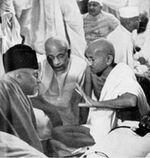(Image added) |
(Adding Category [[Category:{{PAGENAME}}|{{PAGENAME}}]] (automatic)) Tag: apiedit |
||
| (One intermediate revision by one other user not shown) | |||
| Line 35: | Line 35: | ||
{{enWP|Sardar Vallabhbhai Patel}} |
{{enWP|Sardar Vallabhbhai Patel}} |
||
[[Category:Indian people]] |
[[Category:Indian people]] |
||
| + | [[Category:Bharat Ratna recipients]] |
||
| + | [[Category:{{PAGENAME}}]] |
||
Latest revision as of 14:24, 12 August 2017

Azad, Sardar Patel and Gandhi at an AICC meeting in Bombay, 1940.
Vallabhbhai Patel (lang-gu|વલ્લભભાઈ પટેલ), is one of the recipients of Bharat Ratna.
This is the highest civilian award of India.
Credits[]
He was a political and social leader of India who played a major role in the country's struggle for independence and guided its integration into a united, independent nation. In India and across the world, he was often addressed as Sardar, which means Chief in many languages of India.
Life[]
Vallabhbhai Jhaverbhai Patel was born at his maternal uncle's house in Nadiad, Gujarat. Patel entered 31 October as his date of birth on his matriculation examination papers.
He was the fourth son of Jhaverbhai a Hindu by religion and his wife Ladba Patel. They lived in the village of Karamsad, in the Kheda district where Jhaverbhai owned a homestead.
Patel travelled to attend schools in Nadiad, Petlad and Borsad, living self-sufficiently with other boys.
Patel passed his matriculation at the late age of 22.
Patel practised law in Godhra, Borsad and Anand while taking on the financial burdens of his homestead in Karamsad.
Political life[]
Patel gave a speech in Borsad in September 1917, encouraging Indians nationwide to sign Gandhi's petition demanding Swaraj—independence—from the British.
He rose to the leadership of the Indian National Congress and was at the forefront of rebellions and political events, organising the party for elections in 1934 and 1937, and promoting the Quit India movement.
Satyagraha in Gujarat[]
Vallabhbhai Patel began a village-to-village tour in the Kheda district, documenting grievances and asking villagers for their support for a statewide revolt by refusing the payment of taxes.
In Government[]
As the first Home Minister and Deputy Prime Minister of India, Patel organised relief for refugees in Punjab and Delhi, and led efforts to restore peace across the nation.
See also[]
| This page uses Creative Commons Licensed content from Wikipedia (view authors). |
